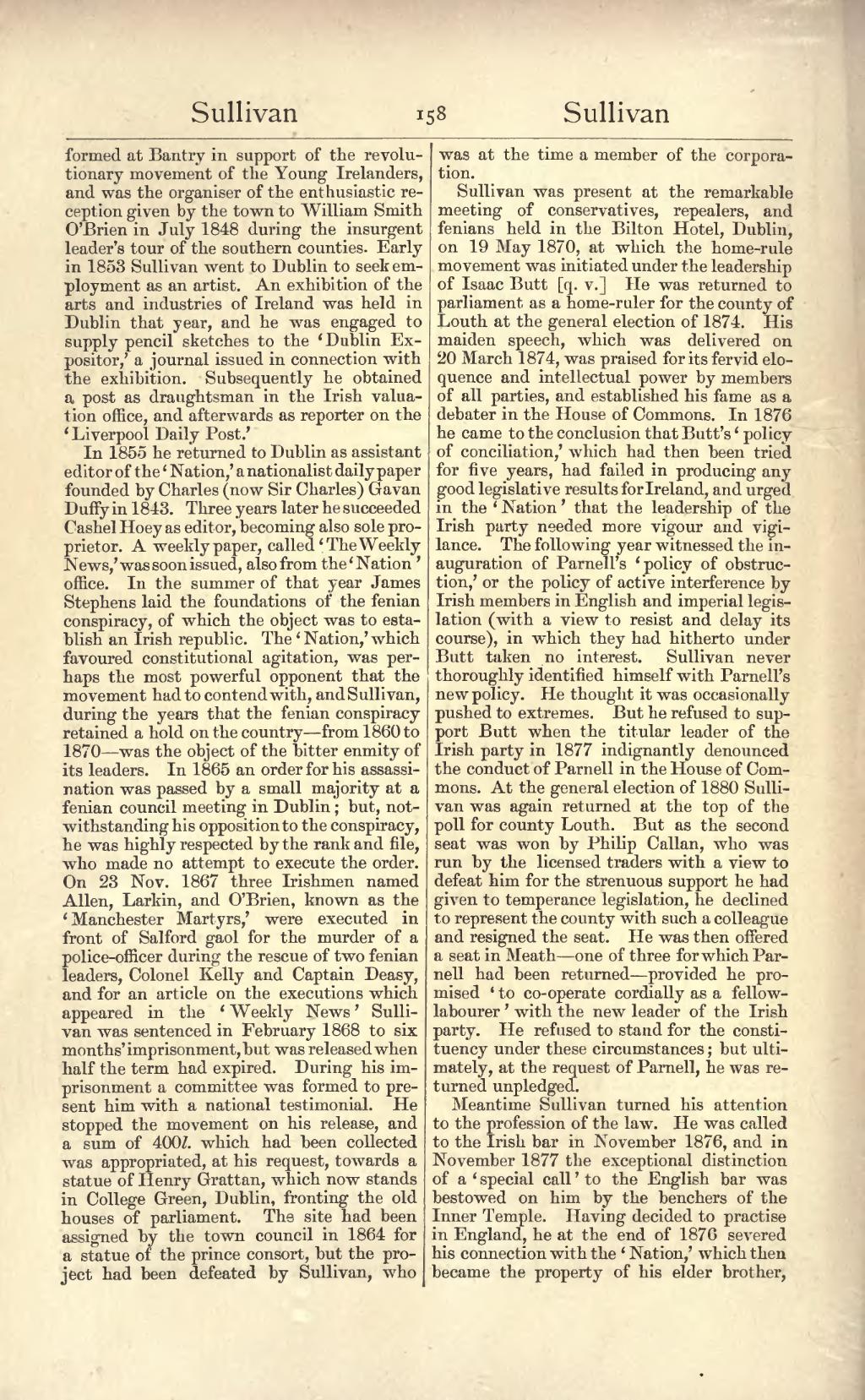formed at Bantry in support of the revolutionary movement of the Young Irelanders, and was the organiser of the enthusiastic reception given by the town to William Smith O'Brien in July 1848 during the insurgent leader's tour of the southern counties. Early in 1853 Sullivan went to Dublin to seek employment as an artist. An exhibition of the arts and industries of Ireland was held in Dublin that year, and he was engaged to supply pencil sketches to the ‘Dublin Expositor,’ a journal issued in connection with the exhibition. Subsequently he obtained a post as draughtsman in the Irish valuation office, and afterwards as reporter on the ‘Liverpool Daily Post.’
In 1855 he returned to Dublin as assistant editor of the ‘Nation,’ a nationalist daily paper founded by Charles (now Sir Charles) Gavan Duffy in 1843. Three years later he succeeded Cashel Hoey as editor, becoming also sole proprietor. A weekly paper, called ‘The Weekly News,’ was soon issued, also from the ‘Nation’ office. In the summer of that year James Stephens laid the foundations of the fenian conspiracy, of which the object was to establish an Irish republic. The ‘Nation,’ which favoured constitutional agitation, was perhaps the most powerful opponent that the movement had to contend with, and Sullivan, during the years that the fenian conspiracy retained a hold on the country—from 1860 to 1870—was the object of the bitter enmity of its leaders. In 1865 an order for his assassination was passed by a small majority at a fenian council meeting in Dublin; but, notwithstanding his opposition to the conspiracy, he was highly respected by the rank and file, who made no attempt to execute the order. On 23 Nov. 1867 three Irishmen named Allen, Larkin, and O'Brien, known as the ‘Manchester Martyrs,’ were executed in front of Salford gaol for the murder of a police-officer during the rescue of two fenian leaders, Colonel Kelly and Captain Deasy, and for an article on the executions which appeared in the ‘Weekly News’ Sullivan was sentenced in February 1868 to six months' imprisonment, but was released when half the term had expired. During his imprisonment a committee was formed to present him with a national testimonial. He stopped the movement on his release, and a sum of 400l. which had been collected was appropriated, at his request, towards a statue of Henry Grattan, which now stands in College Green, Dublin, fronting the old houses of parliament. The site had been assigned by the town council in 1864 for a statue of the prince consort, but the project had been defeated by Sullivan, who was at the time a member of the corporation.
Sullivan was present at the remarkable meeting of conservatives, repealers, and fenians held in the Bilton Hotel, Dublin, on 19 May 1870, at which the home-rule movement was initiated under the leadership of Isaac Butt [q. v.] He was returned to parliament as a home-ruler for the county of Louth at the general election of 1874. His maiden speech, which was delivered on 20 March 1874, was praised for its fervid eloquence and intellectual power by members of all parties, and established his fame as a debater in the House of Commons. In 1876 he came to the conclusion that Butt's ‘policy of conciliation,’ which had then been tried for five years, had failed in producing any good legislative results for Ireland, and urged in the ‘Nation’ that the leadership of the Irish party needed more vigour and vigilance. The following year witnessed the inauguration of Parnell's ‘policy of obstruction,’ or the policy of active interference by Irish members in English and imperial legislation (with a view to resist and delay its course), in which they had hitherto under Butt taken no interest. Sullivan never thoroughly identified himself with Parnell's new policy. He thought it was occasionally pushed to extremes. But he refused to support Butt when the titular leader of the Irish party in 1877 indignantly denounced the conduct of Parnell in the House of Commons. At the general election of 1880 Sullivan was again returned at the top of the poll for county Louth. But as the second seat was won by Philip Callan, who was run by the licensed traders with a view to defeat him for the strenuous support he had given to temperance legislation, he declined to represent the county with such a colleague and resigned the seat. He was then offered a seat in Meath—one of three for which Parnell had been returned—provided he promised ‘to co-operate cordially as a fellow-labourer’ with the new leader of the Irish party. He refused to stand for the constituency under these circumstances; but ultimately, at the request of Parnell, he was returned unpledged.
Meantime Sullivan turned his attention to the profession of the law. He was called to the Irish bar in November 1876, and in November 1877 the exceptional distinction of a ‘special call’ to the English bar was bestowed on him by the benchers of the Inner Temple. Having decided to practise in England, he at the end of 1876 severed his connection with the ‘Nation,’ which then became the property of his elder brother,
